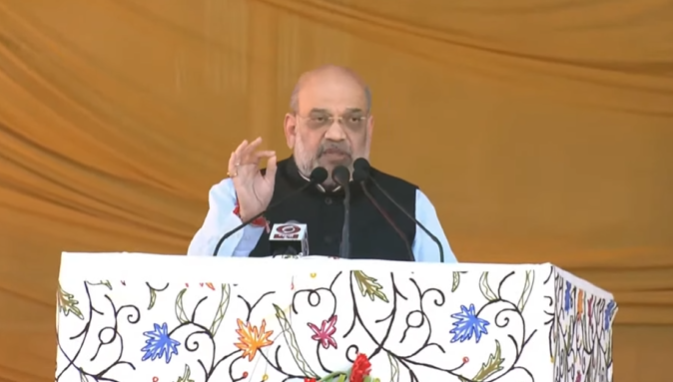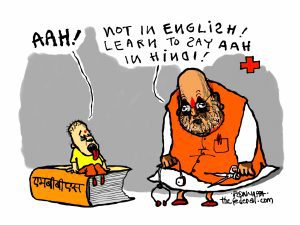
MBBS in Hindi: Ambitious project but concerns remain over practicality
Amit Shah will unveil MBBS textbooks in Hindi in Bhopal on October 16, but concerns remain over how students will keep pace with the latest in the field of medicine

With the launch of Madhya Pradesh government’s ambitious project to impart medical education in Hindi less than a week away, the spotlight is again on the challenges that lie ahead.
Union Home Minister Amit Shah on October 16 will launch the project by unveiling the textbooks of Hindi syllabus of medical education during a programme at Bhopal’s Motilal Nehru stadium, state Medical Education Minister Vishvas Sarang announced a few days ago.

The project is in line with Bharatiya Janata Party’s aim to make Hindi the national language as was proclaimed forcefully by the recent report of Amit Shah-led Committee of Parliament on Official Language that recommended Hindi should compulsorily be made the medium of instruction in all technical and non-technical educational institutions, including central universities.
Currently, medical education is imparted only in English.
Also read: Make Hindi mandatory in all institutions, Amit Shah-led panel recommends
Announcement in March
It was in March that Madhya Pradesh Chief Minister Shivraj Singh Chouhan had announced that Madhya Pradesh would become the first state in India to start medical courses in Hindi. In August, he announced that from the new academic session, the Bachelor of Medicine and Bachelor of Surgery (MBBS) course will be taught in Hindi at the Bhopal-based Gandhi Medical College (GMC) to first year students.
Last week, while reviewing the preparations for the programme, Chouhan said it was a programme to establish the pride of one’s mother tongue and a landmark event to change the mindset of people.
“This will be an example to prove that specialised subjects can be taught in Hindi and not just in English,” he said. Chouhan further said that apart from medical education, engineering, nursing and paramedical courses will also be taught in Hindi in the state in days to come.
‘Transliterated’ textbooks
The first challenge was preparing the textbooks in Hindi. Speaking about it, Sarang said, “The first volume of books for subjects such as physiology, biochemistry and anatomy are ready and students studying in the first year of MBBS, will be given these books.” He added that the second volume of these books was being prepared.
It seems the textbooks in Hindi will be transliterations of textbooks in English. “Books are being prepared in such a manner that technical terms such as blood pressure, spine, heart, kidney and liver or other important body parts and related terms are written in Hindi as they are pronounced in English. They will also be written in brackets in English,” said Sarang, who was behind the initiative.
The textbooks are prepared in such a way that those studying MBBS in Hindi won’t lag behind after completion of the course, as they will learn all the technical and medical terms in English and Hindi, he said.
Challenges ahead
Many experts in the medical field have been expressing reservations over the move and some of these concerns have not been adequately addressed. Former vice-chancellor of Indore-based Devi Ahilyabai Vishwa Vidyalaya (DAVV) and a senior pediatrician, Dr Bharat Chhaperwal, had said when the announcement was made that as a medical professional he felt that not enough preparations were made before announcing the decision.
“Governments should leave this issue to professionals instead of deciding in which language medicine and surgery should be taught,” he was reported as saying in media reports.
When pointed out that in many countries like Japan, Russia, China and France, medical education is being imparted in the mother tongue, Chhaperwal said in these nations an adequate number of quality textbooks are available in their native language, which was not the case in India.
A senior Bhopal-based doctor, Pushpendra Sharma, who has done his MBBS and a course equivalent to MS Surgery from the Odessa State Medical University in Ukraine, said a lot of efforts will be required to make the move successful.
Asked how some other countries are managing to impart medical education in their native language, Sharma said they had been doing so for ages and therefore have developed a rich course content for students.
However, senior BJP leader and a doctor by profession, Dr Hitesh Bajpai, supported the move. “We are committed to provide technical education in the mother tongue of students. One should not be left behind because of any language,” he said.
Keeping abreast with the latest
Many doctors pointed out that in the field of medicine, doctors have to keep abreast with the new research so as to keep with the times. As Dr Arun Kumar Gupta, president of the Delhi Medical Council, pointed out in a media report: “Even if the books are translated, almost all reputable research papers and journals are published in English.”
In this regard, some doctors pointed out that research articles published in quality medical journals like ‘Lancet’, ‘British Medical Journal’ and ‘New England Medical Journal, among others, take three to four years at least to find a place in textbooks. Those who have studied in Hindi, would be left behind in adapting to new initiatives being taken in the medical field.
Finding teachers trained in Hindi
Another concern was finding teachers who could teach MBBS in Hindi.
AIIMS Rishikesh Professor Dr Amit Gupta told Indian Express that “In the entire country, there is not a single college which is conducting MBBS, MDS, or BDS classes in Hindi or any other regional language. The teachers, by default, are trained to teach in English as they’ve also been taught in the same language. So, if the course has to be launched in Hindi, then the teachers will also have to be trained along with translating the entire syllabus, which is going to be a tedious process.”
Also read: Doctors criticise move to start MBBS course in Hindi, call it ‘detrimental’
The students who study MBBS in Hindi will also find it difficult to migrate to other states and institutes for higher education or to practice outside a Hindi-speaking region, for that matter. The fact that these graduates will also not be eligible to go out of India and pursue higher education, fellowship, or research is also a matter of concern that has been raised by many experts.
As it is, students have to clear the National Eligibility cum Entrance Test (NEET-UG) for medical course admissions across India.

